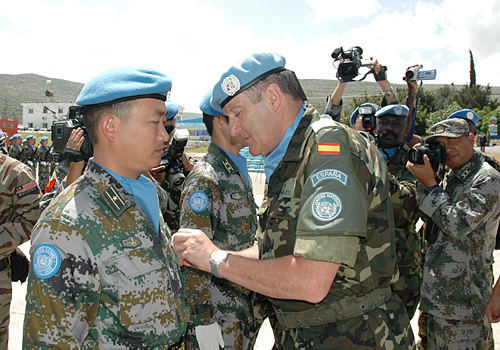|
 |
|
WELL DONE: Alberto Cuevas, head of the UN Interim Force in Lebanon, presents a medal to a member of the Chinese engineering contingent stationed in southern Lebanon on April 23 (PAN LIWEN) |
Experience shows PKOs are most successful when they receive the active cooperation and support of local governments and people; they rarely achieve success without such support. The failure of the UN efforts in Haiti is an example. The UN has made extensive efforts to calm turmoil in Haiti, but the result is far from ideal.
It is necessary for the Security Council to play a leading role in PKOs and to adhere to the principles of the UN Charter to prevent individual countries from going their own way. PKOs carried out by regional organizations should obtain UN authorization and report to the UN. The Security Council should be equipped with quick response capabilities to cope with conflicts and should draw up comprehensive strategies for everything from conflict prevention to peacemaking and peacekeeping.
In all its PKOs, the UN should stick to the fundamental principles of consent, impartiality and a refusal to use force except in self-defense. Although a reinterpretation of these principles has been made in the Report of the Panel on UN Peacekeeping Operations (2000), commonly known as the Brahimi Report, and UN Peacekeeping Operations: Principles and Guidelines, there's no international consensus, and further discussions are needed.
In addition, PKOs should not become the principal means of international peacekeeping. Mediation, peacemaking and negotiation should be used to settle disputes. The UN can intervene only on a limited basis and international intervention should be a final resort, used in extremely difficult conditions. Force must be avoided whenever possible.
Although some regional organizations and multinational forces have occasionally adopted enforcement measures, the nature of their operations is beyond the scope of PKOs. The UN is not a super-government with major military and enforcement capabilities. Conflicts should be settled through dialogue and negotiation, rather than enforcement.
Currently, the gap between the demand for peacekeeping and the UN capability is evident. The UN is constantly burdened by PKO requirements and a lack of human resources, especially professional justice and administration personnel.
The UN also faces financial embarrassment. The budget for PKOs for the 2007-08 fiscal year was nearly $7 billion, three times the regular budget. Meanwhile, the unpaid peacekeeping assessments of member states stand at $3.15 billion, nearly half of the peacekeeping budget for that fiscal year. This shortage of funds will certainly undermine the ability of PKOs.
When planning and implementing PKOs, the UN must consider not only the political conditions, but also the economic endurance of its members. PKOs are not always effective. Joint efforts by conflicting parties, countries and regional organizations are required for their success.
China's participation
As a permanent member of the Security Council, China plays a constructive role in seeking fair and just settlements for important regional issues. It has also been increasing its participation in UN peacekeeping activities.
China believes PKOs must adhere to the principles of the UN Charter, and the Security Council should play a leading role. PKOs must strive to solve disputes through peaceful means, such as mediation, peacemaking and negotiation, rather than force. China insists the UN follow three basic principles: consent, impartiality and a refusal to use force except in self-defense.
In 1990, China sent its first group of military personnel to participate in the UN Truce Supervision Organization. Two years later, it sent an engineering battalion to join the UN Transitional Authority in Cambodia.
To date, the Chinese military has sent more than 15,000 people to PKOs around the world. Nine Chinese soldiers sacrificed their lives in these operations.
China also sent civilian police to UN missions in Timor-Leste, Bosnia and Herzegovina, Kosovo and Haiti.
So far, China has sent only support detachments, such as engineers, transportation and medical corps, to PKOs. Chinese peacekeepers have won praise from the UN, local governments and citizens and fellow peacekeepers from other countries.
In February 2002, the Chinese Government officially designated non-combat troops, including an engineering battalion, a medical unit and two transportation companies, to participate in the UN Standby Arrangements System, a system designed to facilitate the timely deployment of PKOs.
A peacekeeping affairs office was established under China's Ministry of National Defense in 2001 to coordinate the Chinese military's participation in PKOs. China's Ministry of Public Security also set up a special agency for peacekeeping purposes.
Over the past two decades, China has developed an integrated system for training peacekeepers. In August 2000, it established a training center for peacekeeping civilian police in Langfang, Hebei Province. This training center not only trains Chinese civilian police, but also conducts regional peacekeeping training for other Asian countries participating in PKOs. In October 2004, then UN Secretary General Kofi Annan visited the center during his trip to China.
Moreover, China cooperates with the UN by sending officers to receive professional training, attend seminars and conduct study tours abroad. It also hosts seminars on PKOs. For instance, China sponsored an international seminar in Beijing in 2004 to discuss challenges facing PKOs in the 21st century. In 2007, it held a symposium on PKOs with the Association of Southeast Asian Nations.
The author is a council member of the United Nations Association of China | 